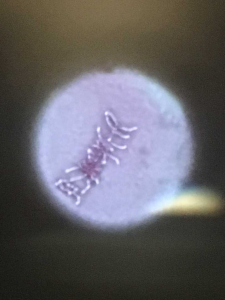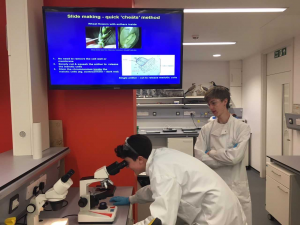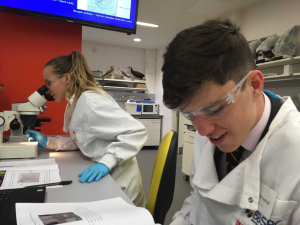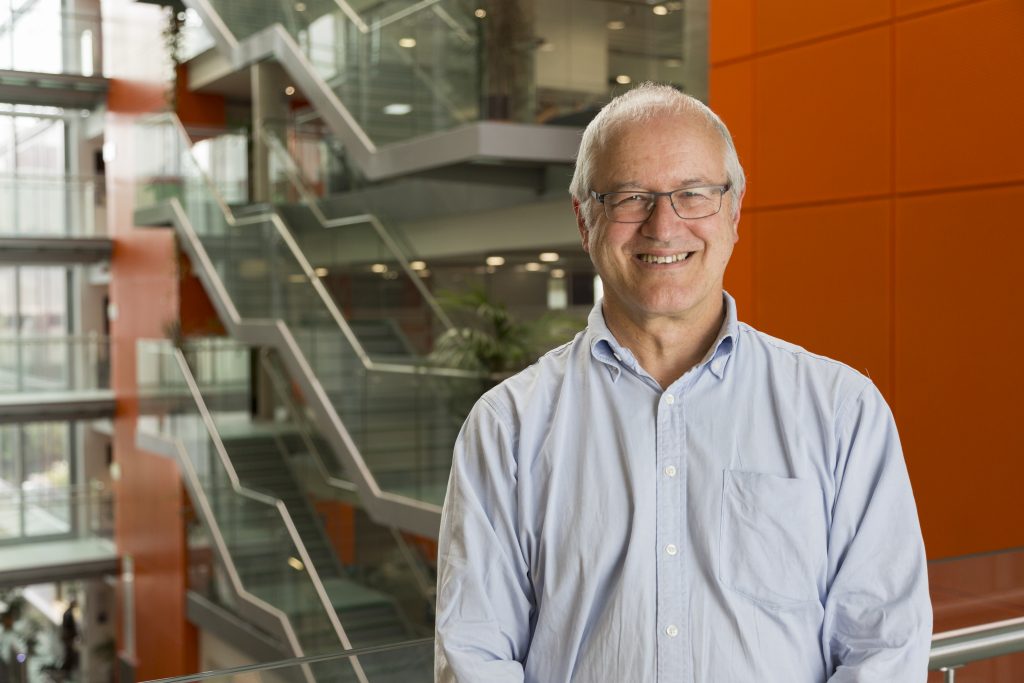Life After a Postgraduate Degree
Alumni Careers Evening
Less than 8% of entry level PhD students end up as tenured academics1, so what do students do after gaining their PhD? What career options are there? The Life Sciences Building held a careers event featuring talks from five University of Bristol alumni to find the answers. Each speaker completed a postgraduate research degree at the University of Bristol and shared their diverse stories of going from postgraduate students to embarking on their careers. They shared their personal experiences on how the skills they learnt throughout their degrees helped them get to where they are today and gave advice on what you can do to achieve your post-research degree career. We also spoke to current postgraduate students at the subsequent networking session about their thoughts on the talks and plans for their own careers.
The first talk of the evening was from Dr Kate Pressland. Kate did a Zoology Bachelor’s degree at Bristol where she particularly enjoyed the field course to Portugal, as this included a lot of species identification. After this, Kate secured a job in Professor Jane Memmot’s group on a field survey project which required a lot of attention to detail and patience. After this contract, she grabbed a PhD opportunity that arose, investigating pheasants as a non-native species. Kate learnt an important lesson while conducting her PhD research: that game keepers or farmers don’t read academic papers but will listen to people who actually talk to them about practises that may benefit them. Kate found this aspect interesting and wanted to work with practitioners in this way. After her PhD, Kate worked for the Avon Wildlife Trust running a wetland conservation project, and is now responsible for managing Innovative Farmers, a farmer-led research programme run by the Soil Association. Kate advises maximising your transferable skills throughout your PhD in order to make you adaptable to job opportunities that may arise, and being open to various job options, such as working for charities.
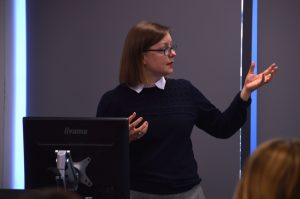
The next speaker was Dr Celia Duff-Farrier, who completed her Biology undergraduate degree and her PhD in Agricultural Biotechnology in the School of Biological Sciences. Celia then took on a short Postdoctoral position in the same lab, with Prof Gary Foster. After this, Celia left academia and went on to undertake the NHS Scientist Training Programme (STP), allowing her to retrain as a Healthcare Scientist in Genomics. The STP is a three-year training programme that trains the individual as a clinical scientist and also provides an MSc qualification. It includes a research project and also an elective project, where Celia went to Brazil to observe private healthcare practices. Celia said that although she initially began her career working in plants, genetics underpins everything, so it is possible to move away from what you originally start working in; however it does require retraining among people who are a lot more knowledgeable about the subject. The working environment is also very different to research labs in a university.

Thirdly, Dr Ana Castro-Castellon spoke about her career in water quality. Ana grew up in Colombia, and then moved to Spain, where she undertook her undergraduate degree in biological sciences. She became interested in microbiology and parasitology and moved to the UK to work as a Regional Biologist for Wessex Water. Ana encountered an environmental issue which deserved further research and, so, decided to undertake an MSc with Prof Marian Yallop and Prof Paul Hayes at Bristol, performing research in the area of Ecosystems and Environmental Change. After this, Ana took the opportunity of completing a PhD in Chemical and Environmental Engineering at the University of Oxford. Following this, she joined Thames Water as a Process Scientist. Her current role ensures that the water we drink meets the regulatory criteria to protect public health and the environment. When pursuing a career, Ana believes that it is important to do something that genuinely matters to you because this gives you the energy to progress in your career. Furthermore, Ana advises to take as many opportunities as you can while you are within a role, in order to grow and move on to the next stage in your career.

The penultimate speaker was Dr Anna Tiley. Anna graduated from the University of Oxford in 2011, she then undertook an internship at Kew Gardens before starting her PhD. Anna’s PhD was carried out in the Molecular Plant Pathology and Fungal Biology group at the University of Bristol – supervised by Dr Andy Bailey and Prof Gary Foster, and was part of the BBSRC South West Biosciences Doctoral Training Partnership (SWBio DTP). As part of this PhD studentship, Anna completed a three-month internship at the Royal Society of Biology. After finishing her PhD, Anna secured a Postdoctoral Researcher role based in the Molecular Plant Pathology lab at University College Dublin (UCD) in Ireland. Anna intends on staying within academia by securing a fellowship and has research interests abroad. Anna believes in the importance of being a well-rounded scientist, her suggestions to postgraduate students for being successful include: attending conferences to present research and network, take on opportunities to teach, join societies and apply for internships and travel grants.
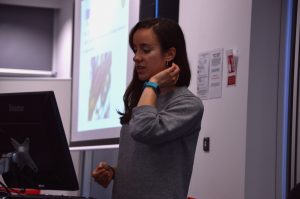
The final speaker was Dr Karen Varnham. Karen was inspired by a lecture on invasive species during her Behavioural Ecology Masters at Manchester Metropolitan. This led to Karen becoming a self-employed, self-titled, rat-catcher, removing invasive rats from islands where they were causing ecological problems. Feeling she was not yet done taking exams, Karen undertook a PhD as a mature student in Bristol, supervised by Jane Memmott in the Community Ecology Group. After completing her PhD, she worked in the LSB Admin Office for a year, before taking up her current role with the RSPB as their Island Restoration Officer. This role involves advising people within and outside the organisation on best practice methods for removing invasive species and preventing them from becoming established in the first place, as well as training, report writing and developing new projects. Her current job is mainly desk-based but includes enough visits to islands to keep her happy. Whilst she enjoyed being self-employed, Karen believes that working for a larger organisation gives her the opportunity to make a greater impact. Karen said that although a PhD was not essential for her current role, it gave Karen vital background understanding of her job, and improved her technical writing skills.
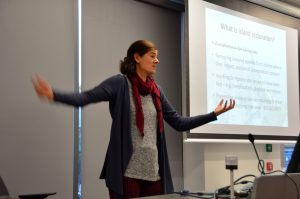
After the talks, a networking session was held in the Life Sciences Skylounge to give students the opportunity to chat with the speakers. General feedback from the audience was how much they enjoyed hearing about the diverse range of career opportunities there are post-PhD. One student said: “although there were only a handful of talks, they are all in different fields, I hadn’t heard of any of these job roles before, so we have been opened to diversity”. Furthermore, for those students who had an idea of what they would like to do, hearing from more people in those fields gave them reassurance: “I’m thinking about working for a charity, and it is nice to know that those working for charities felt valued and it has given me more confidence in the direction I would like to go in”. Overall, this was a fantastic opportunity for postgraduate students to hear from those who have previously been in their situation, to hear how they managed to get to where they are today, and, importantly, provide the students with tips and advice in order to achieve their career goals. Although many students coming to the end of their post-graduate studies are still unsure of what they would like to do next, this event has provided some advice on how they can set themselves up to be in the best possible situation, with many transferrable skills, to ensure they are considered for job opportunities. It is also worth noting that further information for Bristol postgraduates can be found from the Careers Service.
Written by Fiona Belbin (Biological Sciences PhD), and Grace Fraser (year 3 Biology BSc)



